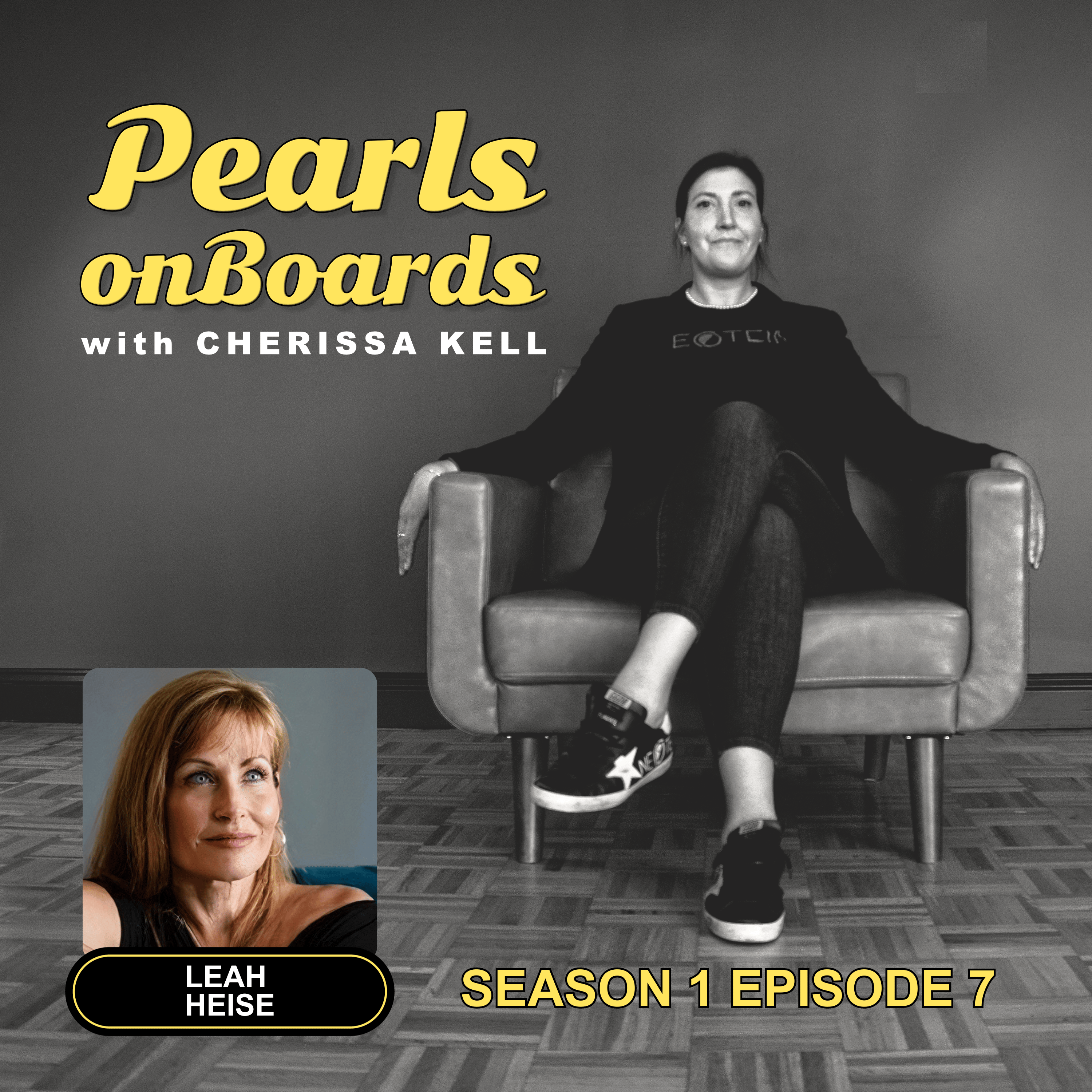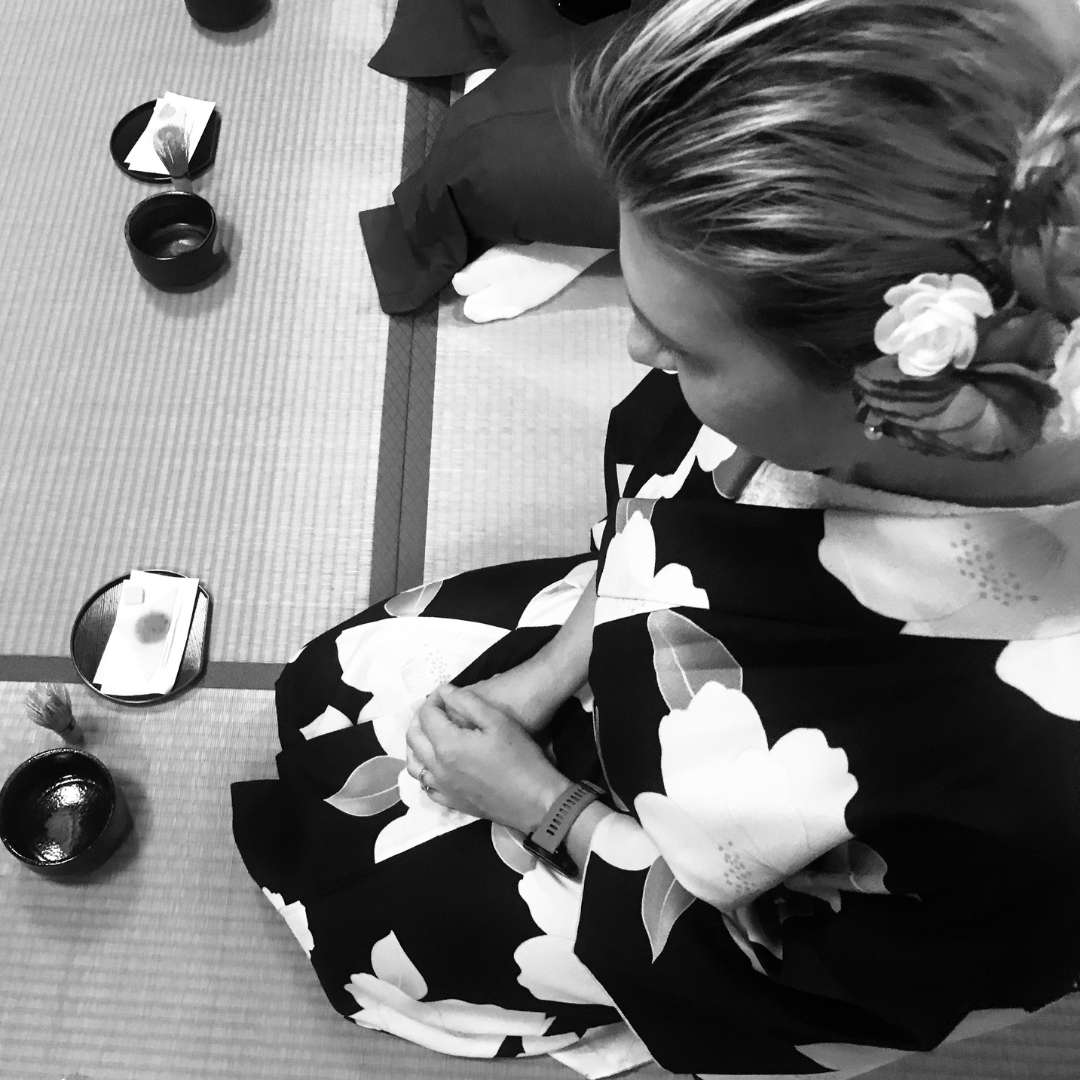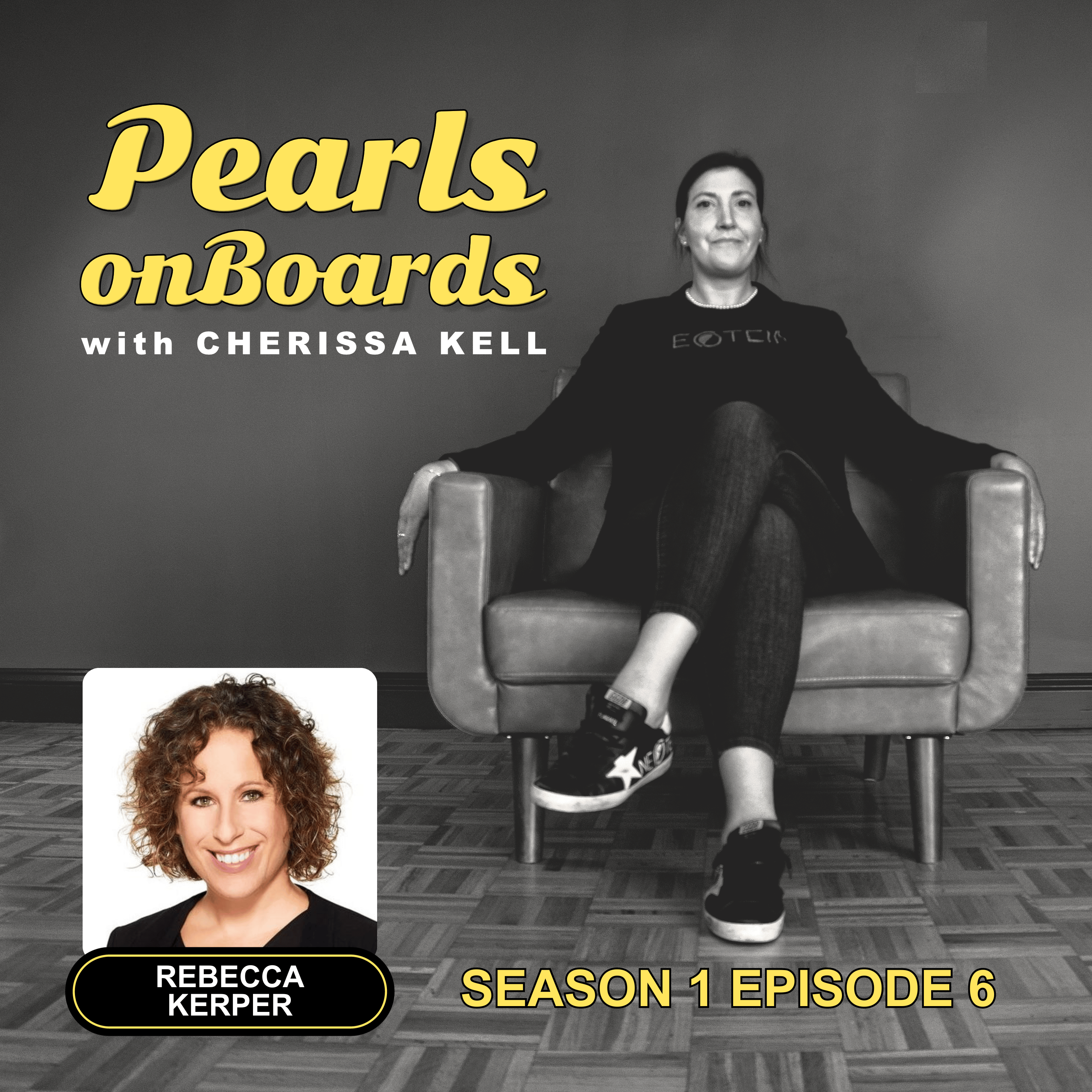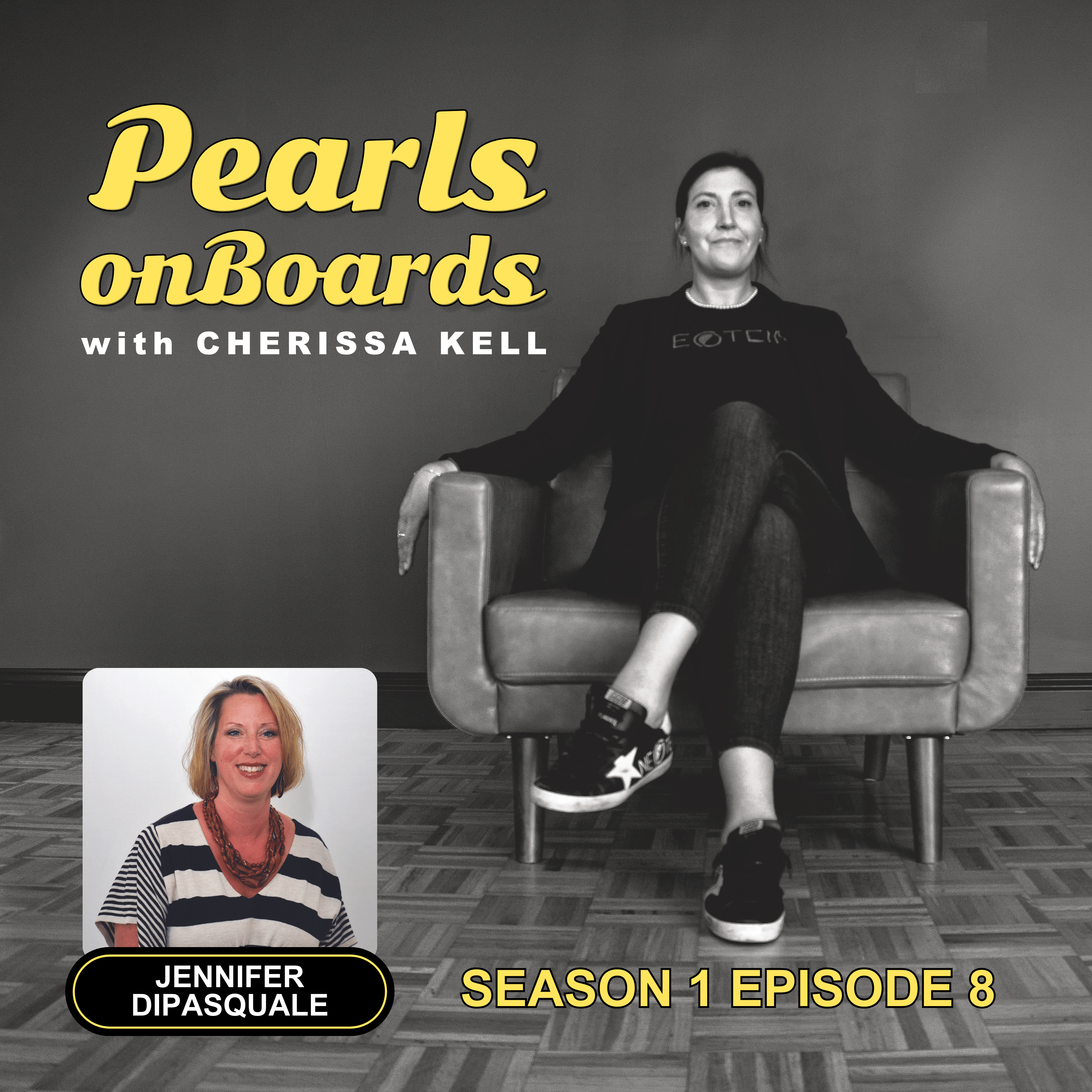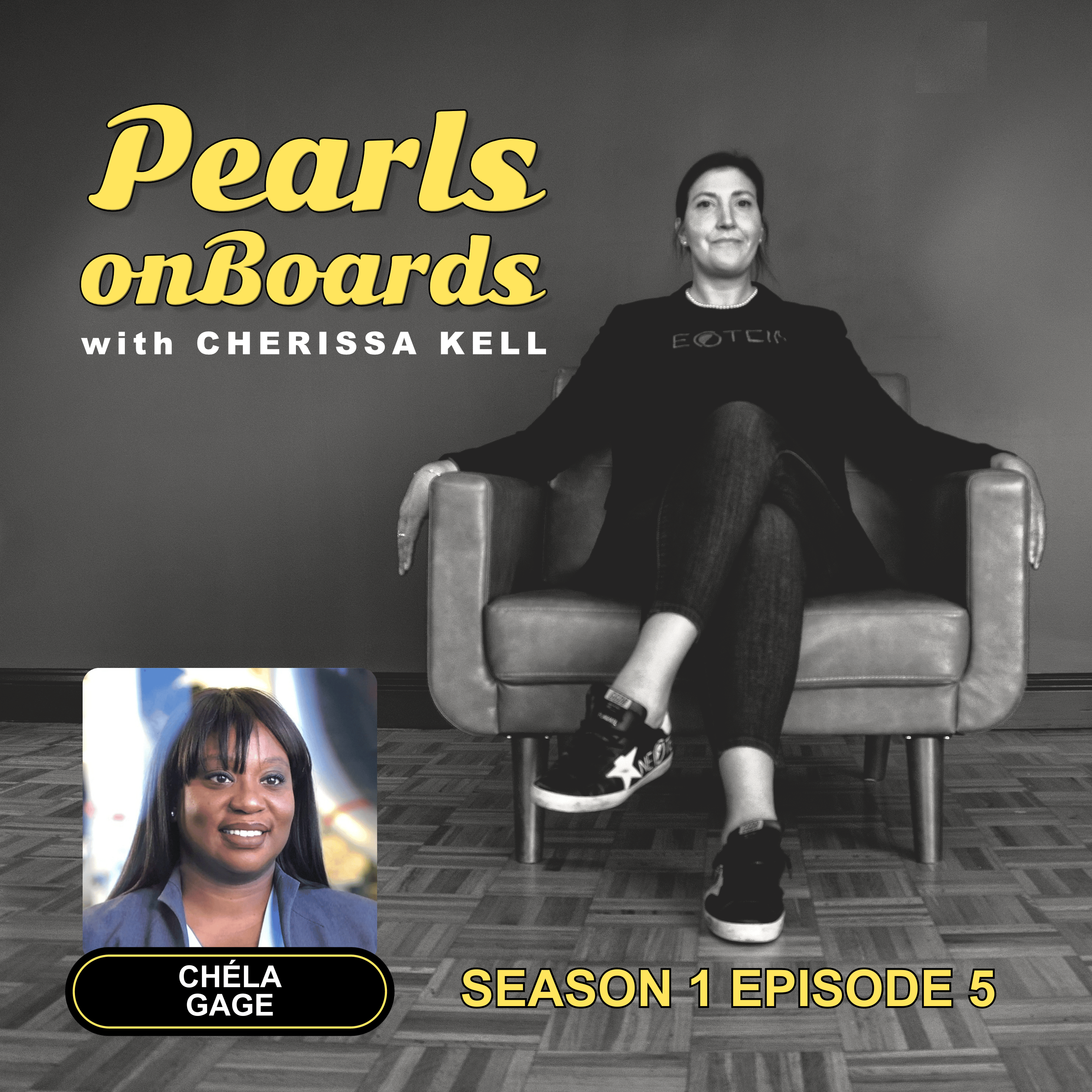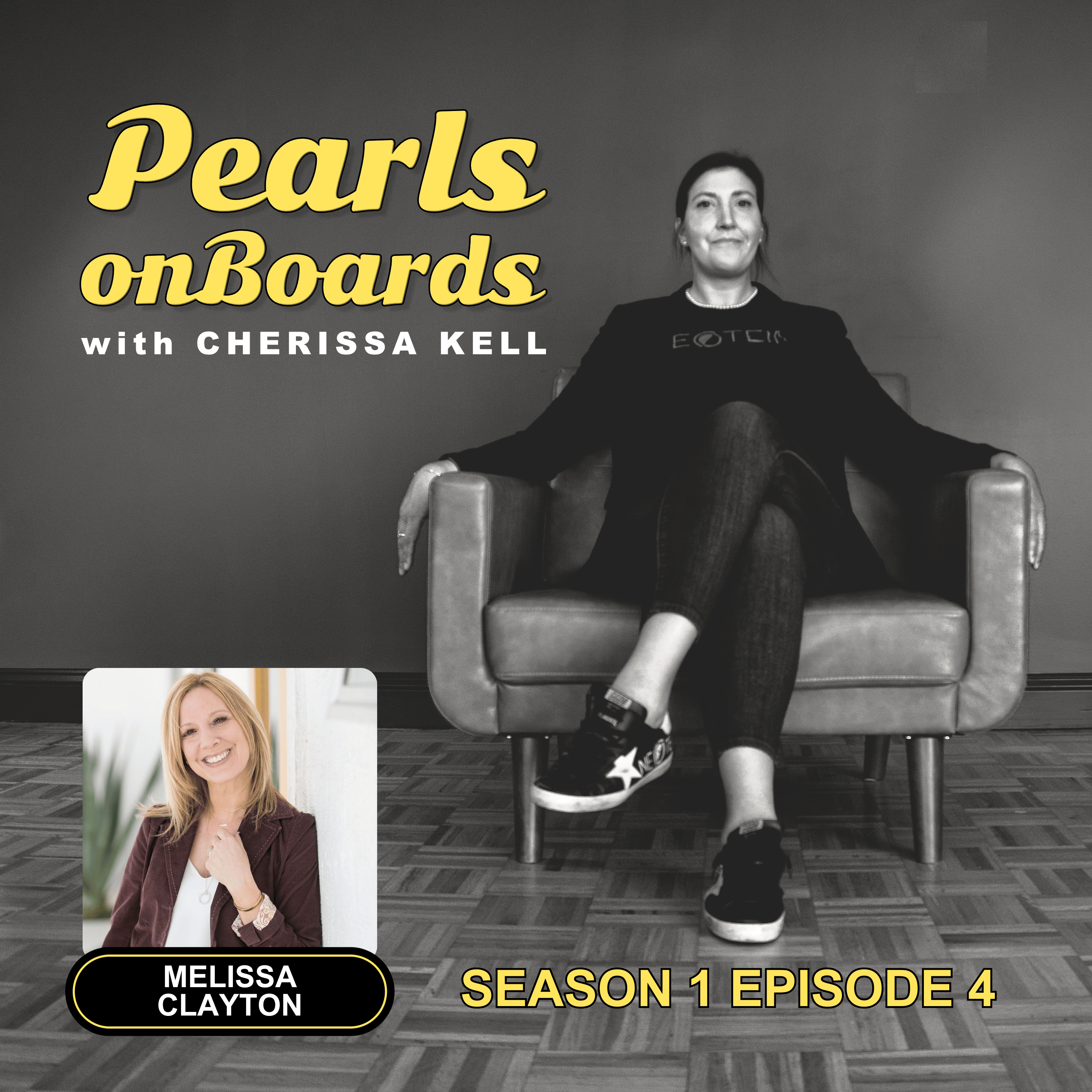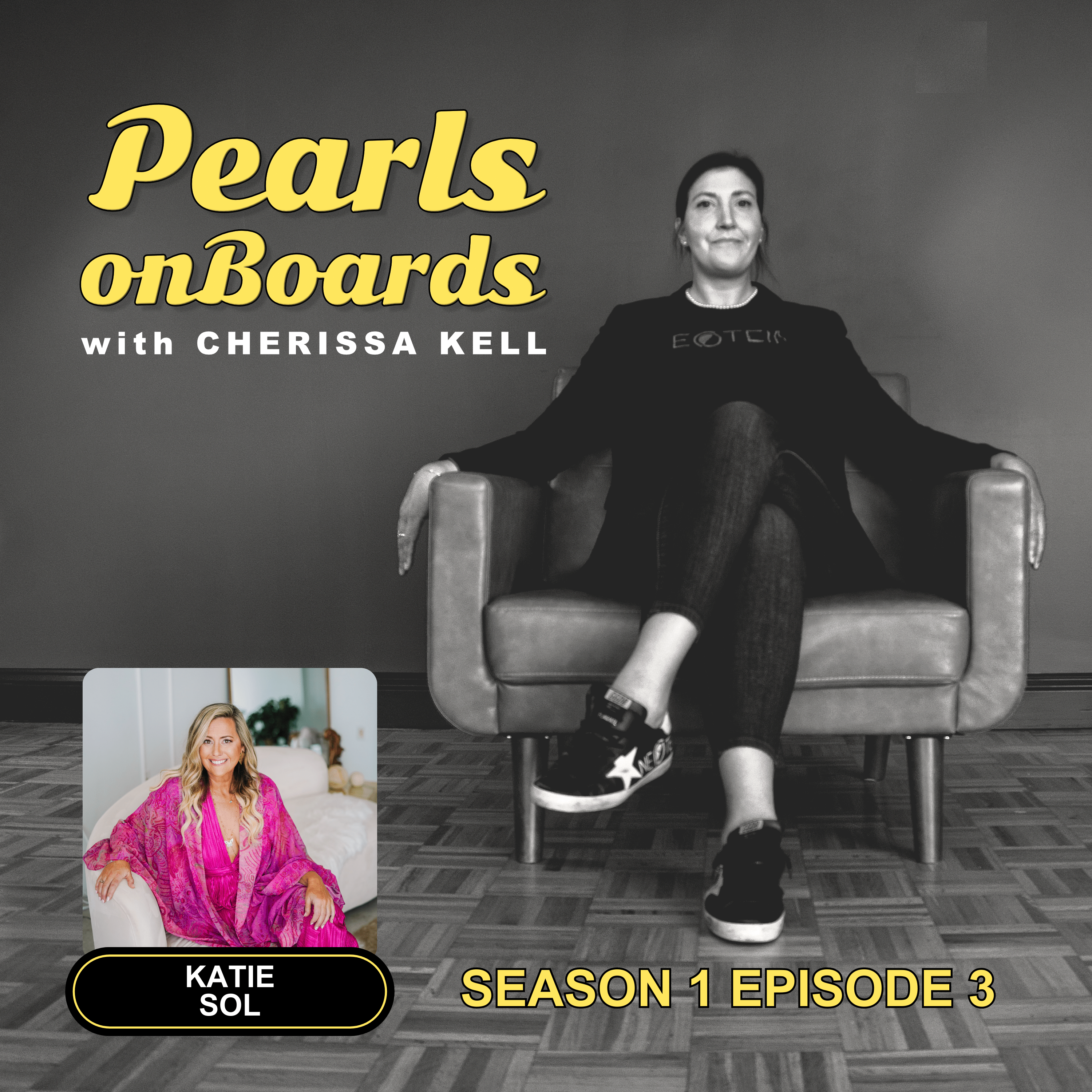Episode Transcript
I think it's good to set boundaries because you're teaching your kids that those boundaries are important, because if you don't, then what's gonna happen is they're gonna see you and your husband working all the time, and they're gonna think that's what life is, is work.
That's what we were taught.
Welcome to this week's episode of Pearls on Boards. I am so excited to sit down with Leah Heath. She is a mom of two. She is an experienced executive regulatory attorney and she has taken, four companies to exit.
So, Leah, thanks for sitting down with me this week. Tell me about your kids. How old are your kids now?
they are 24
Okay. Twins, right?
twins. . Both girls.
Oh gosh. That was fun in high school.
Yeah. I, you know, high school was okay. It, well, You know it was the depression and all that kind of stuff in high school, but middle school, ugh. Middle school girls teach, treat each other like total garbage
And I don't know if that's how they see their parents communicating with each other or other females. it's, so bad.
It's so bad. It has to be. 'cause like where else are they learning it? They're not on social media at four.
Let's hope not. But yeah, I was shocked at the level of, you know, they just gang up on each other and They are not nice at all. and
No, it's awful. And my husband and I, so we're like, when we became parents, you know, I genuinely thought being a mom would somehow like open up this secret passageway to like this group of women that would just be super awesome and supportive, you know? And I had to get off social media because I, it was so just, Like, oh, you breastfeed your baby, but you pump, like, how awful is that?
Like, how dare you pump? Or
We are so judgy as well as a society generally, but like,
females in particular, like who caress breastfeed and pump, who cares if you can't breastfeed because you have mastitis you have some other reason and you
you don't want,
Right. Or you don't want, to, and you have to buy formula or,
you buy breast milk, who cares?
Like you're still a mom. It doesn't make you less of a person. Like I had a c-section. And that was a big thing people, and thank God it wasn't, social media wasn't around then because people were like, oh, you didn't have 'em vaginally? I'm like,
Yeah.
well, there was two of them and I had eclampsia. So they took them
I'm 54 years old. The freaking thing still comes up. I haven't,
Why.
are who caress. I have no idea. It is so bizarre. And then the other thing that's weird is because I had twins, people always ask me whether they were natural
And I'm like, well, you know, I didn't, but it
but why does it matter?
Right.
I'm a twin two. But like, it doesn't matter, like when you have a child, it doesn't matter how a got there, like yeah, it's natural,
I have a, a good friend in Atlanta who's all about surrogacy, and I just never heard about it. I mean, I've like, obviously know what surrogacy is, but I just never thought to ask somebody like, did you carry that baby? 'cause I don't care. It's your baby.
Who caress? It's your baby.
people talk about that.
It's like too, right? Like you're not less of a parent because you adopted a child. You might be more of a parent because you adopted a child. I don't know. You actively chose, invested, did all of the things. Same with I V F. Like you really worked to have the kid. You didn't just, I mean, I just got pregnant and
Me too. Yeah.
like, you know what I mean?
It just, We can't say anything. Literally you can't say anything because everybody is triggered by stuff. And I understand like going through trying to have a baby and all of that is good and miscarriages and all of is, is, is horrible and hard. But that doesn't make my experience any Less.
I know. husband actually yesterday, we were driving. He works with me and so we hang out a lot and so we have riveting conversations and one of them was yesterday, he said something and he's like, He just gotten off the call, off the a call with some guy he's been in the army with.
He was like, Hey, you know, we would love to have, you know your product here because you know we're buddies and why not? He's like, why don't women do that? And I'm like, what do you mean? Call each other and be like, Hey, I can support you. And he's like, yeah. He's like, I watch you like bang down doors get in places, bang them down.
And on the other side is like a friend and you're still like banging down the door, you know? He's like, but in for guys, they just are so like, Hey man, how can I help you out? It's I don't understand why that dynamic is so different.
It is different.
I do find my female friends to be very helpful and willing to connect. Men I think are inherently delegators, so I. Because they're used to delegating everything to their females in their lives. Right. So I think that they're used to doing, constantly connecting, constantly connecting.
Whereas women are like, okay, this, this is more work on me. This is more work. More work, more work. Yeah.
Yeah. That's interesting. And I have boys and I'm like, I don't know how to handle all y'all like
I kind of feel bad for boys in today's society, because, you know, we're switching from the patriarchy to the, to the more feminine, which absolutely needs to happen. I'm a big proponent of it, but to have, especially like a white boy in today's society, like you're about to be flipped on your head of a millennia of privilege and
Well just, and it's hard as a mom, right? 'cause I'm like, yeah, I wanna, I wanna pioneer and support women. I do. , but do you know what? I really wanna pioneer more just like people. Why are we creating so many narratives around so many things? Why is everything so triggering?
Why can't it just be like, Hey, you have a great idea. like, what's that show, that reality show where you can't see the person and they sing, so you can't make judgements on them. You, yeah. Why don't we do that for like life, you know, like, oh man, you're really talented. Oh man, you're really academic.
Oh man, you're really like, that's a really innovative idea. You're so good at business. You're so good at whatever it is you're doing. Like, and not being like, you're so good for a woman, or, you're so good
place that that happens is in white for white men. The number shows it is, And we have a lot more work to do. But the number of times I'm called to do a podcast or an article or something on what I've done, it's always a as in the context of being a woman. Instead of,
I hate that.
here's just what you did, like, why can't it just be what I've done?
Not because I'm a woman. And that somehow makes it,
it feels belittling actually.
it really does. And as like a female executive, I have never seen men approached the way female executives are in of their business. Like the number of times my businesses have been mansplained to me or people think I need help. Men in particular, Hey, have you thought about doing this with your business?
Yeah, it's actually in my strategic plan. Oh, you have a strategic plan? yeah.
I do.
If I have a business.
Right. Like I'm running a business, I actually know what I'm doing. But there's so much of that type of stuff. It's like, I don't go to you and tell you how to do your business. Why are you telling me how to do mine
Mm-hmm. . And I also hate this like I'm a mom, I'm an entrepreneur. I'm not a mompreneur. You know what I mean? Or like, I'm not a mom boss. Like we don't, I, oh, I was telling my husband this the other day. I was like, do you know what drives me mad? You became a dad and everyone at work treated you the same.
Exactly the same.
I became a mom and I'm now just a mom. I'm like relegated to being a mom.
I had this discussion with someone yesterday exactly this discussion about, and it was from a, it was a male perspective and he said, I find it bizarre how dads can just be dad's, but they're always whatever else they are. First like lawyer, dad's, wife, like it's okay they have a wife and kids, but that is not who they are.
But as soon as you have that baby, forever number one, mom.
There's so much. Guilt for women. Like I was talking to a friend the other day and she had a very successful business in fashion when her kid, she started it when, right after she had a baby. 'cause you know, like, why not when you have a three month old, why not start a fashion business in New York City?
Perfect time. And she was like, I felt so much guilt telling my husband, like, Hey, I have to fly to Italy and the next week, Canada and she's like, , I felt anxiety telling him about my next trips, you know, because she's the mom. But men have no anxiety about that. They're just like, I'm going to Italy and then Canada and then, and I, I don't know if it's because of how we're perceived in society when we do that, that makes us feel that way.
Do you know what I mean? Like,
It's absolutely a guilt thing. Even like I have chronic pancreatitis and I was, when my kids were little, I was on disability. And until I found cannabis in 2013. But during that sort of 12 year period where I was a stay at home mom I felt. Guilty, even going to the hospital. So before I would have a hospitalization, I would grocery shop, I would clean the entire house,
meal prep,
eat, meal prep,
all of that stuff.
Plan to make sure my kids could get to school, to softball practice, to wherever it was. Like I would do all the things. Meanwhile, I'm getting admitted into I C U because I have pancreatitis, acute pancreatitis, and I'm walking all hunched over and I'm vomiting and I can't eat. But, but I gotta get all got everything ready.
Yep. So I can have permission. And it's not that my husband wanted me to do
Right, right,
I had to do that for myself because of, I couldn't alleviate my guilt.
I mean, ultimately like our job as parents then and women is to create a safe and loving environment and raise kind, responsible, compassionate humans. Are gonna work and contribute somehow to society and not live in my home. You know, like what I want, but all this nitpicking that we do isn't like creating a, the space for those things.
You know, like would notice that I was like getting depressed and an like, anxious when I had social media because my house wasn't picture perfect and all of these things. 'cause I was like, you know, coloring with a two and three year old boy and they're, they, I literally went to the bathroom and came back and they were naked, fully painted from head to toe.
That's awesome.
And so my house is like when we paint now covered in trash bags, you know what I mean? It's like, but I can't take those pretty little pictures of them. Like with watercolor and white John Johns
it's just not it. It creates a false reality of parenting. I mean, if people can do that and keep their house clean and for them, good for them, I mean, But kids are messy. They come with a lot of crap. They don't put stuff away. It is what it is.
and you're better served spending time with your kids than constantly cleaning up after everything.
I didn't have any of that one because social media wasn't a thing when I, my kids were being raised early on, so it was kind of books and talking to my friends and what it was it like.
And it definitely was less judgy than it is now because there's that anonymity factor to it. You can just post a comment about somebody that you don't even know and just put it up there. It just is. Why, Why? would you put a negative comment up about someone else
Mm-hmm.
When I was growing up, I still had a phone on the wall, right.
So if you called your friend's house and it was a busy signal, that was it. You had to like call back you called back and then in the work world, I didn't have to be on 24 7. I could be on nine to five and do my work and go home and there was a home instead of, now I work at home, so everything's work all the time.
See, and I've had to create boundaries recently about that. 'cause I'm like, okay, so my kids are finally in school full-time, which I feel like has given me this like, whoa, , I can actually get so much done in a day. 'cause they're not here. 'cause I, 'cause I wanna be present when they're home, you know? And,
um, meaningful to me.
It's interesting because one of the first things I find, especially females say, when someone says, how are you doing? You're like, oh, I'm so busy. I'm doing this, I'm doing that. It's like we're trying to win a competition in terms of how busy we are, and it shouldn't be busy. It should be. You have certain times that are blocked out for work and the rest of it's for your life, not work, but we're so defined by what we do.
Well, it's funny 'cause you go to Europe, they're not like that.
Like Paris. I love Parisian people, and they're like, they, they get a lot done and they're a successful society, like by any standard, but like show up at like 10:00 AM you know,
I think amazing. Retirement, I think they get to retire at like 62.
I want to live to see my kids have kids, you know, like I want to be around and not like in a feeble manner, you know? And if that means that I have to set boundaries now,
Well, and I think it's good to set boundaries because you're teaching your kids that those boundaries are important, because if you don't, then what's gonna happen is they're gonna see you and your husband working all the time, and they're gonna think that's what life is, is work.
That's what we were taught.
Mm-hmm.
The first time I really had an epiphany that like working longer days didn't equate to like better life was when we were in Japan. we lived there right before Covid and then for a year during Covid.
So I got to see this like interesting shift. But before Covid, they didn't have work from home. They didn't have hybrid work. You definitely felt like you couldn't leave the office until your boss left. If your boss said, we go out to dinner and drinks after you have to kind of a thing. So there was this like interesting dynamic where people were working long days and it started in their youth, right?
Like where the kids would go to school all day and then they would come home and then they would go to after school until like 9:00 PM And I had my dearest friend in the world, her parents were successful. One is a pharmacist and the other one is a doctor. And they didn't make her do that.
They didn't make her go to the after school and do all of those things. But then we had another friend. her parents were also very successful, but they did make her do those things and they did make her know, go to the afterschool programs. But then I got to look at their lives the same age women raised in the same country.
was raised with that very much like you work long days and, and their livelihoods and their ability earn the same income wasn't different because one of them had a childhood and one of them did. Like, so those extra hours that they spent as children doing math or whatever they were doing till 9:00 PM it didn't translate into a better quality of life as an adult,
I cannot believe that, that you would go TOS 9:00 PM That's a long day for a kid. My kids couldn't have done that. They would've imploded. There is no way. I was very careful about my kids being in one activity at a time. I didn't want stacked activities. I didn't want them in 50,000 things.
So whatever activity they picked, it was for whatever that period of time was. And they wanted to continue that activity, that was fine. But I didn't want them overscheduled. I wanted them to read books and play with their toys and to run around and, and yeah.
just be kids.
I don't want to train them to hustle,
Yep.
you know? want
them to
that's
happy.
We have definitely not done that historically. It, we have all been trained to hustle.
And I think it's time to
expecting. And I
Shifting with you guys. My kids will certainly raise their children differently than I raised them. More balance and that type of thing.
So I think,
we'll start to see a pivot the other way, which is, which is nice. And it seems like your generation that's raising the kids is better focused on mental health and mindfulness and being present in the moment and really communicating with your child, helping them understand their feelings.
Whereas Imogen X and baby boomers tended to teach Gen X is you don't have feelings. Feelings are not a thing that you have, you shove, shove, shove, shove, shove. So then trying to teach your own children that feelings are okay. It's It's a hard thing to do when you've shoved all of your feelings down your entire life.
I love being a mom. I think that being a. Changed my perspective on humanity. It made me feel more connected to the world instead of less connected. Really a desire to focus on being less biased. and it's kind of when my mindset shifted to be more open to different ideologies and religions and political beliefs and all of the things because you're either a mom or you're a kid who had a mom.
You're just kind of universally connected. And I just felt so much more connected to the world through them. And they taught me a ton. It, you know,
being a mom is hard. It's a lot of work. In the United States in particular, I think that there's definitely more I. Mental labor on the female side in everything business and in the workplace or in the, home.
That hasn't balanced out yet. I think with your generation and with my kids and below, they'll start to do some of this analysis of what is really fair play in terms of balancing household dynamics that wasn't around when I was younger. In fact, I just read the book Fair Play and I can't remember who wrote it.
But, for the first time I finally got why I was so annoyed for so long about things that traditionally were items that females have always taken care of but frustrated me with the amount of work. Especially when I went back to work, when I went a stay-at-home mom to being the primary breadwinner.
How come none of that other work went away?
It's all there.
Still there.
Yep. Still a hundred percent
Society still expects you to do all the domestic stuff
Mm-hmm. .
Mm-hmm. . How did you navigate that?
I didn't do a great job.
Yeah, because you can't, you really can't do it all. I'm sorry. This whole like you can't do it all.
I can't do it. I can't do it at the same time. And so things suffered. I have felt a lot of guilt in terms of both work and home that I was focusing so much on work. I finally reached some balance because I learned how to delegate a little bit better instead of just taking everything onto myself.
And honestly, some, several men were mentored me kind of through that on, oh, you just need to delegate. I was like, what do you mean? I just, a, who am I delegating it to without having to teach them how to do everything? What do you mean I can just delegate? And they're like, oh, this is how you do it. I was like, oh, that's fascinating. Yeah.
you actually can have other people do things and then, you know, working gives you more money. So then you have the ability to hire people to do the things that you already do, which then made you realize how you weren't getting any money for what you were doing. But really, you should have been paid like a million bucks to be project managing chauffeur, chef.
You know, all of the things that we are as parents. And then, oh Yeah,
you have that thing called a job too. That's bringing in income to the house. So it's it, it's a tough balance.
I always ask my guests to share one key tip with you. Before she reveals her pearl of wisdom. I wanna thank you for listening and invite you to sign up for my weekly newsletter, why it Matters where I share quick insights about current health trends. I'm excited to announce that next week we have another amazing interview with Jennifer De Pascal.
So stay tuned. Now Let's find out what that Pearl of Wisdom is
I think one you have to analyze what do you want to do? Because when she started to be a mom and maybe she left the workforce, or her skill sets might be different than they are now. Or there's different opportunities, right? Like we have ai now, there's so many social media type jobs. There's influencer jobs, there's people making money at home several hours a day that are making a ton of money where you can work at home with your kids.
And still make a lot of money. So I think like really figure out what it is do you wanna do? It doesn't have to be you're going in back into a corporate job or you're going back into a law firm or whatever it is. Your background might be. Really assess what do you want to do? And if you need a new skillset to do something that you want to do, then do some online classes, do some networking, talk to people who are in that field.
Maybe you wanna be a consultant. So reach out to a couple of consultants on LinkedIn. I talk to people all the time on whether they should enter the cannabis industry, whether they should do consulting, whether they should do executive coaching. What does that look like? People will talk to you. We are a networking society, so take advantage of that.
And also have a really good, strong discussion with your partner about what the realities. Are going to be when you return to work because there likely will be a shift in, or should be a shift in the way that the household is managed. Single stay at home moms tend to manage 99% of the work in the household because somebody else is maintaining the home and being the provider.
But if that dynamic is going to switch, have the discussion about what your expectations are and be comfortable having those difficult conversations when you are frustrated when you know you've worked 15 hours in one day because your company's going public in a week. And. The house looks like a bomb.
Be comfortable saying, I'm feeling frustrated because the house is a disaster and I'm the only one that's picking up, but yet I'm spending 15 hours a day trying to get this company public. That will create wealth for us long term. So be very comfortable and having those conversations. And those are difficult conversations to have because they're fueled by frustration.
And they're not conversations that we've been taught to have growing up in our life. We're taught that we do it all but we do not have to do that.
And that's the most important thing, right? You're communicating, you know what their expectations are, you're taking them at their for what they need, and you're meeting them where they need you to meet them. So that's all good.
Yeah. we're all just trying to figure this thing out.
Yep.
One day at a
I would love to talk to you forever, so let's stay in touch. This has been great. I'll talk to you later.
Bye.
Bye.
